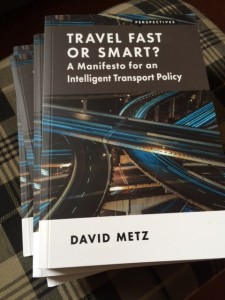It’s always a pleasure when a new Perspectives title arrives in hard copy, and this morning it was [amazon_link id=”1907994599″ target=”_blank” ]Travel Fast or Smart? A manifesto for an intelligent transport policy[/amazon_link] by David Metz – not quite out yet but [amazon_link id=”1907994599″ target=”_blank” ]available for pre-order[/amazon_link].

A Perspective on transport policy
As he begins: “Britain does not have a coherent transport policy. And conventional transport economics has reached a dead end.” The essence of his plea is for joining up of planning transport investments with thinking about the geography of economic development, which sounds obvious but has never been done. A big part of the reason, David argues, is that the value of a transport investment is calculated in isolation largely on the basis of supposed savings in travel time. “But these time savings are not real. What is real and readily observed are the changes in how land is used and valued when transport investments make such land more accessible – which the economists disregard.”
So – I would say this – an excellent and concise demolition of the policy vacuum and a set of principles for a different approach. Worth reading alongside our previous title, Christian Wolmar’s [amazon_link id=”1907994564″ target=”_blank” ]Are Trams Socialist?[/amazon_link]
[amazon_image id=”1907994564″ link=”true” target=”_blank” size=”medium” ]Are Trams Socialist?: Why Britain Has No Transport Policy (Perspectives)[/amazon_image]
Interestingly, I just recently took part in a workshop on infrastructure investment in Manchester, organised by my colleague Graham Winch over at the business school. Among both academics and practitioners, there was a consensus that current appraisal methods are wholly inadequate – they are designed for marginal changes and don’t take account of system effects, non-linearities or spillovers – and this needs to be a big part of the research agenda.
